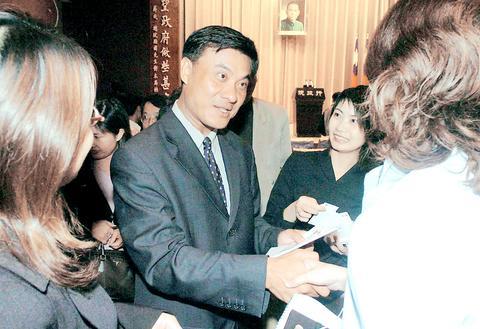While Premier Yu Shyi-kun vowed yesterday that the Cabinet would not revoke the Taipei City Govern-ment's permit for a massive demonstration on Saturday, newly appointed Minister of the Interior Su Jia-chyuan (
"While we hope the city government will cancel the application [filed by the pan-blue alliance], I hope the city authorities will shoulder all responsibility if they decide to uphold their original decision," Yu said.
The Cabinet will not nullify the application of the planned mass demonstration, Yu said, because the last thing he wanted to see was the public blaming the Cabinet for encroaching on the city's authority.

PHOTO: CHIANG YING-YING, TAIPEI TIMES
Su said that while he hoped to discuss the matter face to face with Ma on Friday, when he officially takes up his new position, he would settle for talking over the phone.
"It's not my intention to give orders to my old friend. I was just trying to help," he said.
Yu and Su made the remarks yesterday morning in response to media inquiries about the Cabinet's stance on the planned rally during a press conference where Yu officially announced Su's appointment.
Su succeeded Yu Cheng-hsien (
Su's remaining 20-month mandate will be fulfilled by Pingtung County Deputy Commissioner Wu Ying-wen (
In addition to Yu Cheng-hsien, Tsai Chao-ming (
National Police Administration Director-General Chang Si-liang (
Su yesterday said that he did not have time yet to ponder any possible candidates for Chang's successor but was convinced that he was a responsible and hard-working person.
Yu Shyi-kun said that he respected Su's choice for his successor as long as it was the right person in the right place.
The premier also made it clear that the setting up of a special committee under a special law to investigate the election-eve assassination attempt -- as proposed in the Legislative Yuan by the pan-blue camp -- did not tally with the constitutional system of five government branches.
Yu Shyi-kun said that if the legislature passed the special law, the Cabinet would not rule out the possibility of requesting a constitutional interpretation from the Council of Grand Justices.
Commenting on the removal by police of college students staging a "hunger strike" at the CKS Memorial Hall, Yu Shyi-kun said that the move was based on the government's concern over the students' health.
"However, we'll do our best to safeguard their right of assembly if they insist on making their appeals via peaceful means," he said.
No more than 15 students at one time are taking turns going without food for 12 hours, calling their action a hunger strike. The students started the protest on Friday to call on political leaders across party lines to apologize for what the students call the social disorder of the past four years and to establish a "truth task force" to investigate the attempted assassination of the president and vice president. They also accuse Chen of manipulating the media and abandoning administrative neutrality.
Also See Stories:
Mind your own business: Ma
`Hunger-strikers' linked to parties
Pan-blues want task-force referendum

INVESTIGATION: The case is the latest instance of a DPP figure being implicated in an espionage network accused of allegedly leaking information to Chinese intelligence Democratic Progressive Party (DPP) member Ho Jen-chieh (何仁傑) was detained and held incommunicado yesterday on suspicion of spying for China during his tenure as assistant to then-minister of foreign affairs Joseph Wu (吳釗燮). The Taipei District Prosecutors’ Office said Ho was implicated during its investigation into alleged spying activities by former Presidential Office consultant Wu Shang-yu (吳尚雨). Prosecutors said there is reason to believe Ho breached the National Security Act (國家安全法) by leaking classified Ministry of Foreign Affairs information to Chinese intelligence. Following interrogation, prosecutors petitioned the Taipei District Court to detain Ho, citing concerns over potential collusion or tampering of evidence. The

Seventy percent of middle and elementary schools now conduct English classes entirely in English, the Ministry of Education said, as it encourages schools nationwide to adopt this practice Minister of Education (MOE) Cheng Ying-yao (鄭英耀) is scheduled to present a report on the government’s bilingual education policy to the Legislative Yuan’s Education and Culture Committee today. The report would outline strategies aimed at expanding access to education, reducing regional disparities and improving talent cultivation. Implementation of bilingual education policies has varied across local governments, occasionally drawing public criticism. For example, some schools have required teachers of non-English subjects to pass English proficiency

‘FORM OF PROTEST’: The German Institute Taipei said it was ‘shocked’ to see Nazi symbolism used in connection with political aims as it condemned the incident Sung Chien-liang (宋建樑), who led efforts to recall Democratic Progressive Party (DPP) Legislator Lee Kun-cheng (李坤城), was released on bail of NT$80,000 yesterday amid an outcry over a Nazi armband he wore to questioning the night before. Sung arrived at the New Taipei City District Prosecutors’ Office for questioning in a recall petition forgery case on Tuesday night wearing a red armband bearing a swastika, carrying a copy of Adolf Hitler’s Mein Kampf and giving a Nazi salute. Sung left the building at 1:15am without the armband and apparently covering the book with a coat. This is a serious international scandal and Chinese

NEGOTIATIONS: The US response to the countermeasures and plans Taiwan presented has been positive, including boosting procurement and investment, the president said Taiwan is included in the first group for trade negotiations with the US, President William Lai (賴清德) said yesterday, as he seeks to shield Taiwanese exporters from a 32 percent tariff. In Washington, US Trade Representative Jamieson Greer said in an interview on Fox News on Thursday that he would speak to his Taiwanese and Israeli counterparts yesterday about tariffs after holding a long discussion with the Vietnamese earlier. US President Donald Trump on Wednesday postponed punishing levies on multiple trade partners, including Taiwan, for three months after trillions of US dollars were wiped off global markets. He has maintained a 10 percent